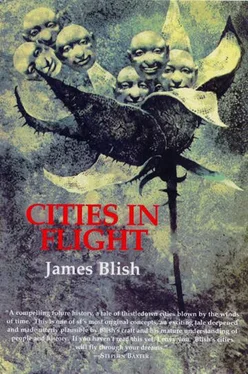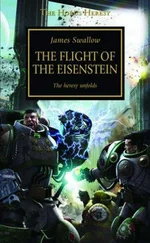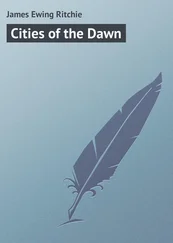James Blish - Cities in Flight
Здесь есть возможность читать онлайн «James Blish - Cities in Flight» весь текст электронной книги совершенно бесплатно (целиком полную версию без сокращений). В некоторых случаях можно слушать аудио, скачать через торрент в формате fb2 и присутствует краткое содержание. Жанр: Фантастика и фэнтези, на английском языке. Описание произведения, (предисловие) а так же отзывы посетителей доступны на портале библиотеки ЛибКат.
- Название:Cities in Flight
- Автор:
- Жанр:
- Год:неизвестен
- ISBN:нет данных
- Рейтинг книги:4 / 5. Голосов: 1
-
Избранное:Добавить в избранное
- Отзывы:
-
Ваша оценка:
- 80
- 1
- 2
- 3
- 4
- 5
Cities in Flight: краткое содержание, описание и аннотация
Предлагаем к чтению аннотацию, описание, краткое содержание или предисловие (зависит от того, что написал сам автор книги «Cities in Flight»). Если вы не нашли необходимую информацию о книге — напишите в комментариях, мы постараемся отыскать её.
Cities in Flight — читать онлайн бесплатно полную книгу (весь текст) целиком
Ниже представлен текст книги, разбитый по страницам. Система сохранения места последней прочитанной страницы, позволяет с удобством читать онлайн бесплатно книгу «Cities in Flight», без необходимости каждый раз заново искать на чём Вы остановились. Поставьте закладку, и сможете в любой момент перейти на страницу, на которой закончили чтение.
Интервал:
Закладка:
This time, however, at long last, it was impossible to ignore any part of this great orchestra. Its composite uproar was enormous, implacable, incredible even for Jupiter, overwhelming even in this season. The moment he heard it, Helmuth knew that he had waited too long.
The Bridge was not going to last much longer. Not unless every man and woman on Jupiter V fought without sleep to keep it up, throughout this passage of the Red Spot and the South Tropical Disturbance—
—if even that would serve. The great groans that were rising through the tornado-riven mists from the caissons were becoming steadily, spasmodically deeper; their hinges were already overloaded. And the deck of the Bridge was beginning to rise and fall a little, as though slow, frozen waves were passing along it from one unfinished end to the other. The queasy, lazy tidal swell made the beetle tip first its nose into the winds, then its tail, then back again, so that it took almost all of the current Helmuth could feed into the magnet windings to keep the craft stuck to the rails on the deck at all. Cruising the deck seemed to be out of the question; there was not enough power left over for the engines—almost every available erg had to be devoted to staying put.
But there was still the rest of the Grand Tour to be made. And still one direction which Helmuth had yet to explore:
Straight down.
Down to the ice; down to the Ninth Circle, where everything stops, and never starts again.
There was a set of tracks leading down one of the Bridge’s great buttresses, on to which Helmuth could switch the beetle in nearby sector 94. It took him only a few moments to set the small craft to creeping, head downward, toward the surface.
The meters on the ghost board had already told him that the wind velocity fell off abruptly at twenty-one miles—that is, eleven miles down from the deck—in this sector, which was in the lee of The Glacier, a long rib of mountain-range which terminated nearby. He was unprepared, however, for the near-calm itself. There was some wind, of course, as there was everywhere on Jupiter, especially at this season; but the worst gusts were little more than a few hundred miles per hour, and occasionally the meter fell as low as seventy-five.
The lull was dream-like. The beetle crawled downward through it, like a skin-diver who has already passed the safety-knot on his line, but is too drugged by the ecstasy of the depths to care. At fifteen miles, something white flashed in the fan-lights, and was gone. Then another; three more. And then, suddenly, a whole stream of them.
Belatedly, Helmuth stopped the beetle and peered ahead, but the white things were gone now. No, there were more of them, drifting quite slowly through the lights. As the wind died momentarily, they almost seemed to hover, pulsating slowly—
Helmuth heard himself grunt with astonishment. Once, in a moment of fancy, he had thought of Jovian jellyfish. That was what these looked like—jellyfish, not of the sea, but of the air. They were ten-ribbed, translucent, ranging in size from that of a closed fist to one as big as a football. They were beautiful—and looked incredibly delicate for this furious planet.
Helmuth reached forward to turn up the lights, but the wind rose just as his hand closed on the knob, and the creatures were gone. In the increased glare, Helmuth saw instead that there was a large platform jutting out from the buttress not far below him, just to one side of the rails. It was enclosed and roofed, but the material was transparent. And there was motion inside it.
He had no idea what the structure could be; evidently it was recent. Although he had never been below the deck in this sector before, he knew the plans well enough to recall that they had specified no such excrescence.
For a wild instant he had thought that there was a man on Jupiter already; but as he pulled up just above the platform’s roof, he realized that the moving thing inside was—of course—a robot: a misshapen, many-tentacled thing about twice the size of a man. It was working busily with bottles and flasks, of which it seemed to have thousands on benches and shelves all around it. The whole enclosure was a litter of what Helmuth took to be chemical apparatus, and off to one side was an object which might have been a microscope.
The robot looked up at him and gesticulated with two or three tentacles. At first Helmuth failed to understand; then he saw that the machine was pointing to the fanlights, and obediently turned them almost all the way down. In the resulting Jovian gloom he could see that the laboratory—for that was obviously what it was—had plenty of artificial light of its own.
There was, of course, no way that he could talk to the robot, nor it to him. If he wanted to, he could talk to the person operating it; but he knew the assignment of every man and woman on Jupiter V, and running this thing was no part of any of their duties. There was not even any provision for it on the boards—
A white light began to wink on the ghost board. That would be the incoming line for Europa. Was somebody on that snowball in charge of this many-tentacled experimenter, using Jupiter V’s booster station to amplify the signals that guided it? Curiously, he plugged the jack in.
“Hello, the Bridge! Who’s on duty there?”
“Hello, Europa. This is Bob Helmuth. Is this your robot I’m looking at, in sector ninety-four?”
“That’s me,” the voice said. It was impossible to avoid thinking of it as coming from the robot itself. “This is Doc Barth. How do you like my laboratory?”
“Very cosy,” Helmuth said. “I didn’t even know it existed. What do you do in it?”
“We just got it installed this year. It’s to study the Jovian life-forms. You’ve seen them?”
“You mean the jellyfish? Are they really alive?”
“Yes,” the robot said. “We are keeping it under our hats until we have more data, but we knew that sooner or later one of you beetle-goosers would see them. They’re alive, all right. They’ve got a colloidal continuum-discontinuum exactly like protoplasm—except that it uses liquid ammonia as a sol substrate, instead of water.”
“But what do they live on?” Helmuth said.
“Ah, that’s the question. Some form of aerial plankton, that’s certain; we’ve found the digested remnants inside them, but haven’t captured any live specimens of it yet. The digested fragments don’t offer us much to go on. And what does the plankton live on? I only wish I knew.”
Helmuth thought about it. Life on Jupiter. It did not matter that it was simple in structure, and virtually helpless in the winds. It was life all the same, even down here in the frozen pits of a hell no living man would ever visit. And who could know, if jellyfish rode the Jovian air, what Leviathans might not swim the Jovian seas?
“You don’t seem to be much impressed,” the robot said. “Jellyfish and plankton probably aren’t very exciting to a layman. But the implications are tremendous. It’s going to cause quite a stir among biologists, let me tell you.”
“I can believe that,” Helmuth said. “I was just taken aback, that’s all. We’ve always thought of Jupiter as lifeless—”
“That’s right. But now we know better. Well, back to work; I’ll be talking to you.” The robot flourished its tentacles and bent over a workbench.
Abstractedly, Helmuth backed the beetle off and turned it upward again. Barth, he remembered, was the man who had found a fossil on Europa. Earlier, there had been an officer doing a tour of duty in the Jovian system who had spent some of his spare time cutting soil samples, in search of bacteria. Probably he had found some; scientists of the age before space-flight had even found them in meteors. The Earth and Mars were not the only places in the universe that would harbor life, after all; perhaps it was—everywhere. If it could exist in a place like Jupiter, there was no logical reason to rule it out even on the Sun—some animated flame no one would recognize as life ….
Читать дальшеИнтервал:
Закладка:
Похожие книги на «Cities in Flight»
Представляем Вашему вниманию похожие книги на «Cities in Flight» списком для выбора. Мы отобрали схожую по названию и смыслу литературу в надежде предоставить читателям больше вариантов отыскать новые, интересные, ещё непрочитанные произведения.
Обсуждение, отзывы о книге «Cities in Flight» и просто собственные мнения читателей. Оставьте ваши комментарии, напишите, что Вы думаете о произведении, его смысле или главных героях. Укажите что конкретно понравилось, а что нет, и почему Вы так считаете.












